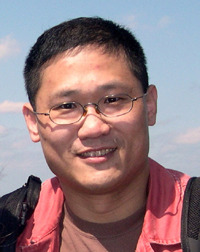Our Science – Cheng Website
Y.S. Robert Cheng, D.V.M., Ph.D.
 |
|
|||||||||||||||||||||||
Biography
Dr. Cheng received his Veterinary Medicine degree from the National Taiwan University and his Ph.D. from the University of Hong Kong. Dr. Cheng is a board registered Veterinary Surgeon back in Hong Kong. He has done his postdoctoral research in the University of Hong Kong (1 year) and the National Cancer Institute at Frederick (5 years) before he joined the University of Massachusetts Medical School as a Research Assistant Professor. In 2006, Dr. Cheng left the Medical College of the University of Cincinnati and re-joined the National Cancer Institute at Frederick as a Staff Scientist.
Research
Toxicogenomic, Epigenetic and Carcinogenesis
Current projects are focused on (1) the identification of early epigenetic changes that would likely contributed to the breast cancer risk in our DMBA treated rat breast cancer model; (2) the profiling of the global RNA expression fingerprints during the early stage of breast cancer development and compare them to the parallel epigenetic study results; (3) the elucidation of the mechanistic role of both Phase I & II detoxification enzymes in the rat breast cancer model.
For the epigenetic studies, Dr. Cheng is using one of global methylation profiling techniques, Methylation Sensitive Restriction Fingerprinting (MSRF) Differential Display Polymerase Chain Reaction (DD-PCR) approach to identify both hypermethylated and hypomethylated genes. Candidates are sub-cloned, sequenced and identified after gene database search. Potential gene targets will be further characterized by bisulfite genomic sequencing and quantitative real time PCR.
Dr. Cheng is using the microarray approach for the high throughput gene expression profiling. All microarray data will be explored with various non-supervised clustering algorithms. Data obtained from consistently clustered dendrograms will be exported for downstream pathway and gene ontology analysis.
Quantitative real time PCR and various enzyme activity assays will be used to elucidate how the Phase I & 2 genes/enzymes reacted to xenobiotics. EROD assay will also be used to measure the activity of Cytochrome P450.
This page was last updated on 7/15/2008.

